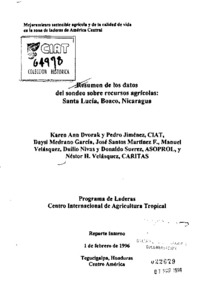Scoping study on natural resources and climate change in Southeast Asia with a focus on agriculture. Final report
Self-governance and forest resources
Forest resources share attributes with many other resource systems that make difficult their governance and management in a sustainable, efficient and equitable manner. Destruction or degradation of forest resources is most likely to occur in open-access forests where those involved, or external authorities, have not established effective governance. Conventional theories applied to forest resources presumed that forest users themselves were incapable of organizing to overcome the temptations to overharvest.
Small scale irrigation interventions for system productivity and natural resource management in Ethiopian highlands: benefits and best-bets
Water scarcity became a common phenomenon in Ethiopia with drought frequency of at least once in three years while the country owns a large irrigation potential that should be exploited sustainably. Various national and international institutions are currently engaged in developing small scale irrigation (SSI) schemes for poverty alleviation.
Shared Control of Natural Resources (SCOR): performance as at end of December 1995
Shared Control of Natural Resources (SCOR): SCOR progress, 1st quarter 1994
Shared Control of Natural Resources (SCOR): SCOR progress, 2nd quarter 1994
Serving both rich and poor
Jin Jokwi Simon, the provincial chief for water and sanitation in North West Cameroon, explaining that irrigated agriculture may soon raise the issue of water rights in the province.
Shared Control of Natural Resources (SCOR): SCOR progress, 3rd quarter 1994
Shared Control of Natural Resources (SCOR) spatial database for planning and monitoring resource use change
Simple rules for catalyzing collective action in natural resource management contexts
This booklet is designed to help people interested in working with small groups (usually communities or groups within communities) to reach their goals. It has been written, building first on the global literature on community based management of forests and other natural resources; secondly, on a base of experience catalyzing collective action within communities in more than 30 communities in 11 countries, using the approach called “Adaptive Collaborative Management” (ACM); and thirdly, through experience trying to catalyze collective action in two communities in Sumatra.


